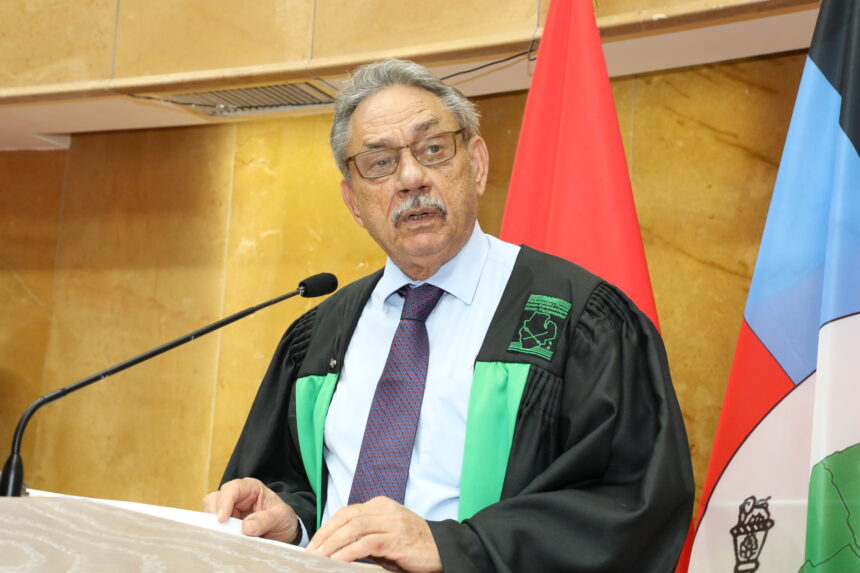Moses Magadza
The outgoing president of the Southern African Development Community Parliamentary Forum (SADC PF), Roger Mancienne, has presented a valedictory report to the executive committee (Exco) of the forum.
He highlighted the progress achieved over the past two years.
The Exco is the management body of the SADC PF, which brings together 15 national SADC parliaments.
It recently held its statutory meeting in Johannesburg ahead of the 56th Plenary Assembly of SADC PF, scheduled for early December in Zambia.
The current Exco, whose two-year term began in 2022, will step down at the plenary.
Mancienne expressed pride in the collective work and sacrifices made by parliamentarians across the region to strengthen the forum’s operations in democratic governance, peace and security, economic advancement, climate change and social justice.
“Exco has largely delivered on its mandate over the last two years, with many objectives achieved and others well on track,” he said.
He highlighted progress towards transforming the forum into a SADC parliament and ongoing efforts to persuade the Comoros to join the SADC PF, saying that this would complete the SADC family.
He acknowledged the need for ongoing resource mobilisation initiatives to ensure the successful operationalisation of various projects, particularly in election observation, which remains crucial for upholding democratic principles across member states.
Mancienne drew attention to the forum’s successful launch of a strategic plan for 2024-2028, which sets six strategic goals to foster parliamentary excellence and enhance socio-economic development in the region.
In terms of regional economic performance, he reported a 3% reduction in inflation and an average economic growth increase of 2.5% over the past two years, despite the lingering impacts of the Covid-19 pandemic.
“Member countries have even begun integrating climate action and energy efficiency into government policies, positioning the SADC region on a path toward economic resilience,” he stated.
Digital transformation featured prominently in Mancienne’s report, as he outlined the forum’s role in enhancing technological integration across SADC parliaments.
The successful onboarding of the Southern African Hub for ICT initiatives and strides in automating internal processes have placed the forum at the forefront of this development.
He noted improvements in the forum’s visibility and outreach, thanks to a well-structured media strategy and active engagement on social media platforms.
He highlighted the importance of climate action as a central objective of the SADC PF.
He recalled that with a focus on disaster risk preparedness and gender mainstreaming, the 54th Plenary Assembly held in Mauritius emphasised climate-related initiatives that have been woven into the forum’s core mandates.
One of the most notable accomplishments highlighted was the signing by 12 member states of an Agreement to Amend the SADC Treaty, establishing the SADC PF after over 15 years of advocacy and engagement with various stakeholders, including heads of state and foreign ministers.
President Mancienne praised the dedication of Exco in overseeing the process, stating: “The transformation into a regional parliament is a source of pride, and represents a significant step forward in our journey toward enhanced parliamentary democracy”.
The establishment of the SADC PF Successors Trust was also a key highlight.
This trust allows the forum to mobilise resources effectively, positioning it as a flexible investment vehicle for the benefit of parliamentary democracy across the region.
In advancing legislative norms, Mancienne said Exco’s efforts to promote Model Laws had set a new standard in the region.
Several legislative frameworks were developed, including laws on public financial management and gender-based violence to enhance governance, uphold human rights, and drive sustainable development throughout the SADC region.
“Our work on standard-setting norms underscores the forum’s commitment to improving the legislative landscape and ensuring that the voices of marginalised groups are heard,” he commented.
Notably, the domestication of the SADC Model Law on Gender-Based Violence, along with other laws, received significant attention, with plans for joint media campaigns and collaborations with organisations such as Equality Now. The forum is also engaging with partners to evaluate and enhance ongoing initiatives addressing child marriage and public health issues.
The valedictory report focused on the operationalisation of a risk management and audit framework, along with the pressing need for enhanced skills in management and operational efficiency reporting.
*Moses Magadza is the media and communications manager at the SADC Parliamentary Forum.



